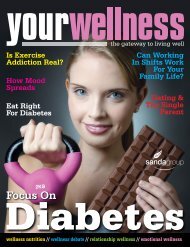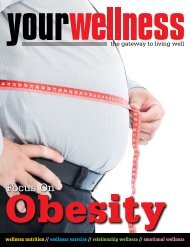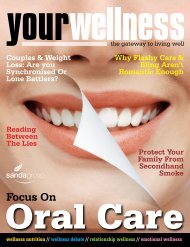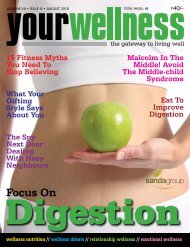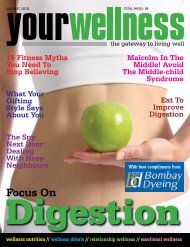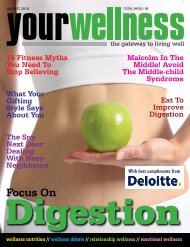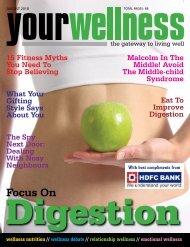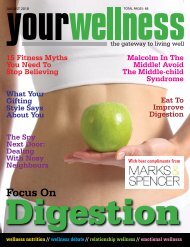Mega Lifesciences_August-18 final
You also want an ePaper? Increase the reach of your titles
YUMPU automatically turns print PDFs into web optimized ePapers that Google loves.
COVER PAGE
PLANT<br />
More than a diet,<br />
it’s a lifestyle!<br />
Tips to get you going<br />
A<br />
plant-based lifestyle is a much more than a diet. It includes having whole plant foods like beans,<br />
greens, grains, vegetables, fruits, nuts and seeds. Abundant in nutrients like vitamins, minerals,<br />
dietary fibre, antioxidants, phytonutrients, and healthy fats, these foods help us live healthier lives by<br />
supporting healthy cholesterol levels, stabilising blood sugar, preventing diabetes, helping us have<br />
healthy blood pressure. They have anti-inflammatory properties and feed the good bacteria in our gut.<br />
They are delicious, very versatile, and keep us feeling and looking great from the inside out. Here are a<br />
few top tips to help you promote a healthy relationship with nourishing foods that happen to be plantbased.<br />
Eating habits are set in early childhood. Choosing plant-based foods can give your child, and<br />
your whole family, a head start in their overall wellness.<br />
02 | <strong>Mega</strong> <strong>Lifesciences</strong>
Remember, our eating habits are works of<br />
progress. You don’t make a switch overnight.<br />
The Physicians Committee for Responsible<br />
Medicine has a few recommendations:<br />
u When shopping in supermarkets and<br />
natural foods stores, look for a stock a<br />
huge array of instant soups and main-dish<br />
vegetarian convenience items.<br />
u While eating out, ask the restaurants to<br />
tweak a dish to include more vegetables<br />
and cut down on meat.<br />
u Use texturised vegetable protein that<br />
mimics the feel of meat.<br />
u When travelling, pack plenty of vegetarian<br />
snacks like instant soups, fresh fruit, raw<br />
vegetables, trail mix, granola bars, and<br />
homemade oatmeal cookies. Fill a cooler<br />
with sandwiches and individual containers<br />
of juice and soymilk.<br />
<strong>Mega</strong> <strong>Lifesciences</strong> | 03
PLANT<br />
How your brain learns to crave<br />
better food<br />
Want to switch over to plantbased<br />
diet but worry that<br />
you’ll miss fast food? Give yourself<br />
more credit than you do! Says a<br />
2014 study in the journal ‘Nutrition<br />
& Diabetes’, your brain can learn<br />
to prefer healthful foods once you<br />
start eating them. Researchers<br />
observed the section of the brain<br />
associated with reward functions<br />
in 13 overweight participants who<br />
were either put on a low-calorie,<br />
low-glycemic diet with high-fibre<br />
fruits and vegetables or part of a<br />
group who made no healthy dietary<br />
changes. While taking MRI images,<br />
researchers showed participants<br />
pictures of both low-calorie and<br />
high-calorie foods. Over time, those<br />
who displayed more brain pleasure<br />
for the low-calorie foods lost more<br />
weight, compared with the other<br />
group. This study has been among<br />
the first to show how your food<br />
cravings can change for the better.<br />
04 | <strong>Mega</strong> <strong>Lifesciences</strong>
ROOTS<br />
MOM & BABY WELLNESS<br />
Want to get pregnant?<br />
Make right food choices<br />
If you’ve been trying to<br />
have a baby for some time<br />
and it’s still not working out,<br />
you probably need to make<br />
some changes to your diet.<br />
According to a 2014 study<br />
published in the ‘Journal of<br />
Clinical Endocrinology and<br />
Metabolism’, higher cholesterol<br />
levels may prevent or delay<br />
pregnancy. The researchers<br />
observed 501 couples enrolled<br />
in the Longitudinal Investigation<br />
of Fertility and the Environment<br />
(LIFE) study and found that<br />
couples with higher total<br />
cholesterol levels showed<br />
lower pregnancy rates or took<br />
longer to become pregnant,<br />
compared with those who had<br />
lower levels, suggesting that<br />
healthful lifestyles may better<br />
your chances of conception.<br />
Being fertile is a part of being<br />
healthy, so a diet that’s good<br />
for you is a diet that’s good for<br />
having a baby.<br />
<strong>Mega</strong> <strong>Lifesciences</strong> | 05
ROOTS<br />
MOM & BABY WELLNESS<br />
Eating for two<br />
The right food choices you make while pregnant lead you feel strong and in<br />
tune with your body. A healthy body, fuelled by clean, plant-based food, will<br />
help to create a physically and emotionally fulfilling pregnancy and childbirth<br />
experience that you dream of. The Physicians Committee for Responsible<br />
Medicine recommends that<br />
u In the 1st trimester, you don’t any additional calories at all.<br />
u In the 2nd trimester, you need an extra 340 calories per day<br />
u In the 3rd trimester, you need an additional 452 calories per day.<br />
All pregnant women must choose their meals wisely. Eat foods that are rich in<br />
nutrients, but not high in fat or sugar, or excessive in calories.<br />
06 | <strong>Mega</strong> <strong>Lifesciences</strong>
<strong>Mega</strong> <strong>Lifesciences</strong> | 07
ROOTS<br />
MOM & BABY WELLNESS<br />
Can plant<br />
foods give all<br />
nutrients?<br />
In 2016, the Academy of Nutrition and Dietetics stated that a<br />
plant-based diet could provide all the nutritional requirements of<br />
adults, children, and those who were pregnant or breastfeeding.<br />
Plant foods provide more than enough protein for the body’s<br />
needs. Agreed, there is a bit of less protein in a vegetarian diet<br />
than a meat-eater’s diet, but this is actually good for you. Excess<br />
protein has been linked to kidney stones, osteoporosis, and<br />
possibly heart disease and some cancers. A diet focused on<br />
beans, whole grains, and vegetables contains adequate amounts<br />
of protein without the excessive amount most meat-eaters get.<br />
08 | <strong>Mega</strong> <strong>Lifesciences</strong>
ROOTS<br />
MOM & BABY WELLNESS<br />
What will your baby get from you?<br />
A carrot or a stent?<br />
In the second trimester, the unborn<br />
child is a sensing, feeling, and<br />
conscious human being. The foods<br />
you eat while pregnant can impact<br />
your baby’s health greatly by either<br />
preventing or giving them chronic<br />
health conditions. Says a 2011 report<br />
published in ‘The FASEB Journal’,<br />
women who eat junk food while<br />
pregnant give birth to junk food<br />
addicts. Exposure to these foods<br />
results in permanent changes within<br />
the central reward system of the<br />
baby and increases their subsequent<br />
desire to overeat junk foods. This<br />
means, your high-fat, high-sugar diet<br />
before birth will give your baby an<br />
increased risk of obesity in later life<br />
and expose them to problems with<br />
heart along with glucose disorders.<br />
Confirm the ‘American Journal<br />
of Cardiology’ and ‘The Journal<br />
of Clinical Investigation’ reports,<br />
“Fatty streak formation occurs in<br />
human foetal arteries and is greatly<br />
worsened by how high the pregnant<br />
mother’s cholesterol is.” So, what will<br />
you choose for your baby? A stent?<br />
Or a carrot?<br />
<strong>Mega</strong> <strong>Lifesciences</strong> | 09
ROOTS<br />
MOM & BABY WELLNESS<br />
Feeding: Get off<br />
to a good start<br />
3 foods to improve<br />
the milk flow...<br />
Fennel seeds – Fennel seeds<br />
boost the quantity of breast milk<br />
because the plant is a great<br />
source of galactagogue.<br />
Apricots – They contain<br />
phytoestrogens, which help<br />
regulate milk-producing<br />
hormones in the body and can<br />
increase lactation.<br />
Green papaya – It is a great<br />
source of galactagogue which<br />
helps improve the flow of milk.<br />
10 | <strong>Mega</strong> <strong>Lifesciences</strong>
u 0-6 months – Exclusively breastfed<br />
(not even water).<br />
u 6months-onwards - Start on<br />
complementary foods of age in<br />
addition to breast milk.<br />
u 6–8 months – Start with thick<br />
porridge, well mashed foods 2-3<br />
times a day plus breastfeeding. Start<br />
with 2–3 tablespoonfuls per feed,<br />
increasing gradually to ½ of a 250 ml<br />
cup.<br />
u 9–11 months – Finely chopped or<br />
mashed foods, and foods that baby<br />
can pick up 3–4 meals per day, plus<br />
breastfeeds. Let the baby have ½ of<br />
a 250-ml cup/ bowl at each meal.<br />
u 12–23 months – Family foods,<br />
chopped or mashed if necessary.<br />
Offer 3–4 meals per day, plus<br />
breastfeeds. Let each meal be ¾ to<br />
full 250 ml cup/bowl.<br />
<strong>Mega</strong> <strong>Lifesciences</strong> | 11
ROOTS<br />
MOM & BABY WELLNESS<br />
Did<br />
you<br />
know?<br />
A 2014 study in the ‘Journal of Midwifery & Reproductive Health’ says that<br />
eating dates in the third trimester leads to greater cervical dilation. Adds<br />
a 2017 report in the ‘Journal of Obstetrics and Gynaecology’, “Dates<br />
consumption during late pregnancy has been shown to positively affect the<br />
outcome of labour and delivery.” It also adds that eating dates reduces the need<br />
for labour augmentation (stimulating the uterus to increase the frequency, duration<br />
and intensity of contractions) with oxytocin. It also reduces the amount of bleeding after birth.<br />
This is, of course, for those who don’t have gestational diabetes. And limit yourself to six<br />
dates a day!<br />
Get calcium,<br />
ditch the dairy!<br />
According to the American<br />
Journal of Clinical Nutrition,<br />
“Some of the best plant sources<br />
of calcium are fortified soy or rice<br />
milk, fortified cranberry, orange, or<br />
apple juice, collard greens, mustard<br />
greens, turnip greens, kale, broccoli,<br />
blackstrap molasses, tofu processed<br />
with calcium sulfate, and tempeh.<br />
Calcium absorption from these foods<br />
has been shown to be excellent.”<br />
Some more calcium-rich foods would<br />
be almonds, butternut squash, chia<br />
seeds, figs and collards.<br />
12 | <strong>Mega</strong> <strong>Lifesciences</strong>
CONSCIOUS<br />
BEAUTY<br />
Honeyed!<br />
Honey is one of<br />
the most versatile<br />
ingredients in your<br />
beauty regimen: For a<br />
honey cleanser stir one<br />
tablespoon raw honey<br />
with two tablespoons<br />
jojoba oil or coconut<br />
oil until the mixture is<br />
spreadable consistency.<br />
Apply to clean, dry skin,<br />
and massage gently in a<br />
circular motion, avoiding<br />
your eye area. Rinse with<br />
tepid water.<br />
<strong>Mega</strong> <strong>Lifesciences</strong> | 13
THE BUDDHA BOWL<br />
WHOLESOME EATS<br />
Eat a rainbow!<br />
Honey Oranges, reds, greens, purples...with whole grains, plant proteins, and vegetables, you<br />
can have a rainbow of wellness in a bowl. Here’s how to go about it:<br />
u Eat as many colours and nutrient-dense foods as possible.<br />
u Get creative. Mix n match! swap out different ingredients for variety and to make use of whatever<br />
you have on hand.<br />
u Tweak it to your taste preferences and make sure no bowl is like the other.<br />
u Balance. Avoid eating too much or too little of everything. Include whole grain, lean protein, tons of<br />
vegetables, nuts, seeds, and a plant dressing of choice.<br />
Tip: A veggie salad is low in calories and high in nutrients, but it can leave you a little short of feeling<br />
full. Top it with avocado. According to a study published in the ‘Nutrition Journal’, avocados are<br />
nutrient-dense with properties that make you feel full.<br />
14 | <strong>Mega</strong> <strong>Lifesciences</strong>
<strong>Mega</strong> <strong>Lifesciences</strong> | 15
EVERGREEN<br />
MOOD & MIND<br />
Saffron for<br />
the green<br />
goddess<br />
About 15% of new mothers<br />
go through the mood<br />
swings, low energy and<br />
postpartum depression. Says<br />
a study in ‘The Journal of the<br />
American Botanical Council’,<br />
“New mothers who were<br />
taking saffron had significantly<br />
greater improvement on the<br />
depression. Impressively, 66%<br />
of the women on saffron were in<br />
complete remission compared<br />
to just 6% of the women who did<br />
not take saffron.”<br />
16 | <strong>Mega</strong> <strong>Lifesciences</strong>
GREENHEART<br />
SEX & RELATIONSHIPS<br />
Sexy plants!<br />
Choose plants, not pills, says Dr Michael Greger,<br />
renowned American physician, author, and<br />
professional speaker on the benefits of a whole foods,<br />
plant-based diet. “Heart-healthy lifestyle changes are<br />
sex-healthy lifestyle changes.” Dr Greger believes that<br />
putting women on a more plant-based diet may help with<br />
sexual functioning. And the same with men: A significant<br />
improvement in international Index of Erectile Function<br />
scores. In fact, he adds, “the largest study on diet and<br />
erectile dysfunction found that “each additional daily<br />
serving of fruits or vegetables may reduce the risk by<br />
10%.”<br />
Dark chocolate – Chocolate contains L-arginine, an<br />
amino acid that can be an effective natural sex-enhancer<br />
for both women and men. It works by increasing nitric<br />
oxide and promoting blood flow to your sexual organs,<br />
which increases sensation, satisfaction, and desire.<br />
Quick tip: Look for anything above 65% of dark<br />
chocolate.<br />
Maca – According to a 2008 study<br />
in the journal ‘CNS Neuroscience &<br />
Therapeutics’, women who take maca<br />
root report improved orgasms and<br />
better sexual satisfaction.<br />
Quick tip: Add maca powder to your<br />
smoothies or coconut water.<br />
<strong>Mega</strong> <strong>Lifesciences</strong> | 17
PLANT POWER<br />
FOOD & FITNESS<br />
Enter the<br />
green gym!<br />
Plants can also work to build the<br />
muscles. The Academy of Nutrition<br />
and Dietetics, USA, have recommended<br />
that athletes who follow a plant-based<br />
diet can meet their protein and amino<br />
acid requirements from a range of plantbased<br />
proteins, found in foods like grains,<br />
legumes, nuts and seeds, that ensure that<br />
all essential amino acids are present. They<br />
should also have enough high-protein plant<br />
foods to support recovery and adaptation<br />
from training, which include pumpkin<br />
seeds (dried, uncooked), lentils (red, split,<br />
uncooked), black beans (uncooked), raw<br />
almonds (raw), tempeh, tofu, rolled oats and<br />
uncooked quinoa.<br />
0<strong>18</strong> | <strong>Mega</strong> <strong>Lifesciences</strong>
NIP ’EM<br />
IN THE BUD<br />
MYTH<br />
OF THE<br />
MONTH<br />
Eating a plant-based diet will<br />
leave you hungry and weak!<br />
Fact: Whole, plant-based foods help<br />
you load up on fibre, which makes<br />
you feel full and stabilises your blood<br />
sugar levels to prevent cravings.<br />
<strong>Mega</strong> <strong>Lifesciences</strong> | 019








